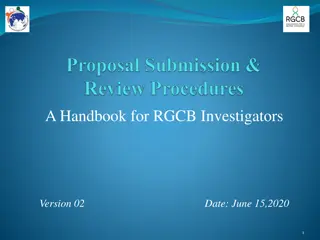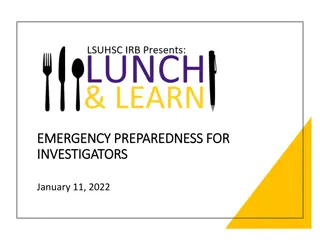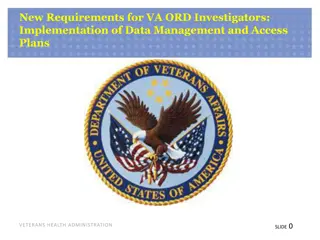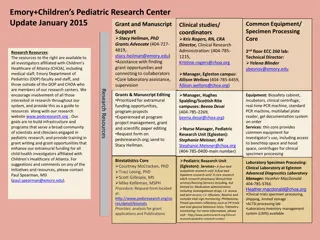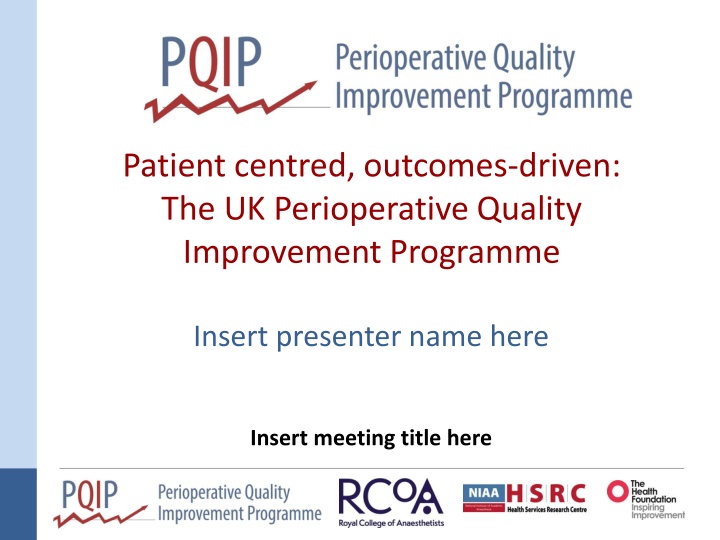
Improving Perioperative Quality in the UK: Patient-Centred Approach
Enhance perioperative outcomes through the UK Perioperative Quality Improvement Programme focusing on patient-centred care. Addressing unknowns and striving to implement national systems for measuring outcomes to boost survival and quality of life for surgical patients in the UK.
Download Presentation

Please find below an Image/Link to download the presentation.
The content on the website is provided AS IS for your information and personal use only. It may not be sold, licensed, or shared on other websites without obtaining consent from the author. If you encounter any issues during the download, it is possible that the publisher has removed the file from their server.
You are allowed to download the files provided on this website for personal or commercial use, subject to the condition that they are used lawfully. All files are the property of their respective owners.
The content on the website is provided AS IS for your information and personal use only. It may not be sold, licensed, or shared on other websites without obtaining consent from the author.
E N D
Presentation Transcript
Patient centred, outcomes-driven: The UK Perioperative Quality Improvement Programme Insert presenter name here Insert meeting title here
A bit of background 10 million procedures per year Between 250,000 and 1 million high risk Mortality of inpatient surgery 0.5 1% Morbidity ?15%
Morbidity has a big impact on patients Reduced survival Reduced health-related quality of life Independent of preoperative risk factors Biologically plausible mechanisms underpinning this relationship
Different measures + systems: same patterns US: 2005 Annals of Surgery UK: 2014 BJA
We dont know the UK rate of Postoperative complications Apart from surgical indicators e.g. return to theatre Failure to rescue Patients who die after a complication US data indicate a big variation
Failure to rescue: US Ghaferi et al NEJM 2009
More things we dont know Impact of complications on society Return to work Health-related quality of life (for example, average NHS 90 day readmission rate after elective colorectal surgery is 20% - what impact does that have on longer term outcomes, health-related quality of life, and ability to work or be a carer)?
Mission To implement a national system for measuring perioperative outcome for major surgery with quality improvement as an objective from the outset To improve survival and quality of life for thousands of surgical patients in the UK every year
PQIP: methods Sample of five patients per week undergoing major surgery in each hospital cystectomy, major Head & Neck, major GI, major thoracics, major HPB Patient consent required We will collect data on: patient risk factors, perioperative care, postoperative complications and longer term health related quality of life (at 6 and 12 months after surgery)
PQIP: methods The website will provide real time feedback on key quality indicators, aiming to really help teams focus on opportunities for local QI Big emphasis on team approach to improvement: PQIP is supported by all the relevant royal colleges and faculties including surgery, nurses, pain, ICM and anaesthesia.
What PQIP is A quality improvement programme A health services research project NIHR portfolio adopted therefore we should be able to access help for recruiting patients and entering data An opportunity to look at structures, processes and outcomes at team level An opportunity to define and improve failure to rescue rates in the UK for the first time
What PQIP is not An opportunity for surgeon bashing About publishing surgeon-specific mortality or morbidity data Another pointless counting exercise
What we would like you to do (please) Engagement with data collection Research nurses will help But entering preoperative data online while in theatre/at the end of surgery should be straightforward Trainees can you be mobilised to help with postoperative data? PQIP has Royal College support from RCS and RCoA
What we would like you to do (please) Engage with quality improvement Collecting the data is only the beginning Using the data is the important and fun bit Opportunities for QI abound: Enhanced recovery compliance Perioperative pain and temperature management Patient satisfaction and quality of recovery Postoperative complications
We want to make this fun! Regular podcasts and videos Engagement with local teams through selfie videos Provide learning opportunities at every opportunity
What now? Over the next few weeks: Look at PQIP website for updates (www.pqip.org.uk) Join twitter feed (@pqipnews) Volunteer to help with data collection/management! Start learning about QI Free online training: http://www.prism-ed.com/Level-1-Module






